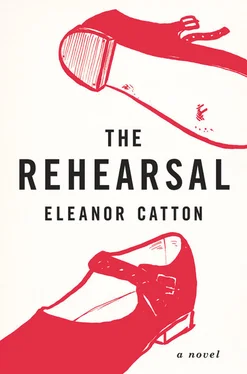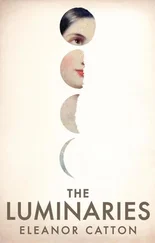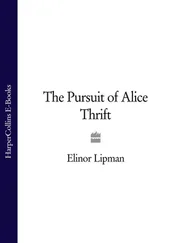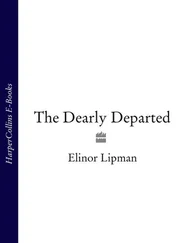“A taboo is something that makes people feel uncomfortable.”
“A taboo is something that we’re not ready for.”
This last interjection was from the girl sitting on the Head of Acting’s right-hand side. When she spoke he started in surprise and sought her out with his clear pale eyes, and after a moment he smiled a rare and unexpected smile. “Something that we’re not ready for,” he repeated. “Good.”
They talked about magic and ritual and sacrifice for a few minutes, and then the Head of Acting asked, “Is death a taboo?” He looked searchingly at each of them in turn. “Once upon a time death was a great taboo. Is it still?”
Stanley sat and frowned at the floor. The Head of Acting’s pale darting gaze unnerved him. The tutor asked every question with majesty and a pointed reservation, as if emphasizing the profundity of the issues at stake and reminding them that none of them was really capable of a meaningful answer. The cold simplicity with which the Head of Acting spoke made something flutter in Stanley’s pelvis, as if the forbiddenness was amplified somehow by the tutor’s detachment: it was as if the Head of Acting was being deliberately casual, Stanley thought, like a veteran reprobate offering a cigarette to a child and pretending not to notice the child’s blush, and shrug, and stammer.
There was something powerfully strange about the conversation as a whole, as if taboo itself was a forbidden subject. Stanley had the vague sense that they were being tempted, and none of them quite understood how. He squirmed and waited for the flutter in his pelvis to pass. Most of the students, like him, were looking uncomfortable, sitting with their eyes cast down and waiting for the tutor to pounce.
“Stanley,” the tutor said, pouncing. “Is death a great taboo?”
Stanley made his hands into fists and pressed his knuckles into the floorboards as he thought.
“No,” he said at last. “Not anymore.”
“Why?”
“Because people pretend to die all the time,” Stanley said. “I watch people pretending to die every time I turn the television on.”
“So?” said the Head of Acting, but he looked eager, and his lips were drawn back.
Stanley said, “If death was a great taboo, then pretending to be dead would have consequences.”
The Head of Acting gave a brisk satisfied nod and turned back to the group. Stanley drew a breath. He was sweating.
“Let me tell you about my father’s death,” the tutor said. “He died in his own bed, and after his death my family spent one evening with his body before he was taken away. I had heard about rigor mortis. I found it an interesting concept, but I was also a little suspicious of it, as if it might be an old wives’ tale, something archaic that didn’t happen anymore.
“I sat by my father’s bed and watched over him, and every hour or so I would sneak forward and give him a little poke, just a little poke with my index finger, in the fold of skin underneath his cheekbone where his skin was all pouchy and soft. I kept touching his cheek like this, routinely, waiting for the stiffness to set in. And after a while it did. I leaned forward and poked at his cheek and it was hard as a board.
“It was the delay that I found frightening,” he said. “He was soft for so long, and then it was like somebody flipped a switch. The delay frightened me. The delay between two of death’s symptoms—rigor mortis and the stopping of the heart. All of a sudden I saw death not as something solitary and final but as an incremental process, a slow accumulation of symptoms, a gradual stepping-down. I had never thought of death in this way before.”
They were watching him warily now.
“This is a very personal memory for me,” the Head of Acting said, “because I had always imagined that at the death of my father I would feel very great sadness, even hysteria, that I would cry and cry like I’d seen my sisters cry, that afterward I would feel a deep longing for what was irreplaceable about my father, and I would have to work to rebuild my life as normal. I imagined that after it happened I would take time to think about my own mortality, but with a new appreciation and reverence for the brevity of life.” The Head of Acting’s voice was steady but his voice was very soft, and somehow intensified by the hush, like the savage clear-blue flame of a gas hob turned low.
“But that didn’t happen for me,” he said. “I didn’t cry. I didn’t feel a great sadness, and I quickly replaced everything about him that I needed to. My own mortality was just as it had ever been, that was all. I thought I knew how I would react to the death of my father, and I was wrong.
“Like Stanley,” the Head of Acting said, quickening and shifting into a new, brisker gear, “any one of you can turn on your television set and watch somebody pretend to die. You all will have seen thousands of deaths which are not deaths but merely people pretending. If I said right now, ‘You have been shot!’ you would all roll around on the floor and clutch your bellies and twitch and moan, and what you would be doing— all you would be doing—is copying a copy.
“What I am asking of you for homework,” he said, “is not to prepare a performance of death, for most of you have no first-hand knowledge of what it means for somebody to truly die. Instead I would like each of you to prepare a performance of your most intimate experience. You will place yourself at the mercy of this experience by showing this intimate moment to the rest of the group. The aim of this exercise is to see how we can use these terribly private experiences as a form of emotional substitute when we come to act a scene or a situation that we don’t understand.”
There was a grudging silence. Everybody tried not to look at everybody else. They quickly tried to think up all the relatively unpainful moments of their lives that they would be prepared to re-create in front of the class and pretend that it was the most intimate experience of their lives.
The Head of Acting let the silence gather for a moment. Lazily he thought, What would happen if one of them performed a scene from one of my classes? What if the most intimate moment in one of these kids’ lives was actually a connection with me , some kind of precious moment with me , and they had the gall to re-create it in class in front of the rest of them? He pursed his lips as he weighed the possibility in his mind. He thought, It would never happen. None of them would dare.
“I myself have used the memory of my father’s death many times in my acting career,” the Head of Acting said at last. “I have recalled it, I have re-imagined it, I have replayed it until the memory is sucked of all useful juice and I have learned something. I used it as Løvborg. I used it as Kent. I used it as the Chief Tragedian, believe it or not. I used it as Algie.”
On the floor, Stanley was thinking of his own father: he pictured him with them now, leaning against the barre with his hands in his pockets and winking solemnly at Stanley as he caught his eye above the sea of nodding heads on the gymnasium floor. He would hate the Head of Acting, Stanley thought, and he imagined what his father would say now: That’s right, worship the things that break you down. Worship the deaths and the divorces, and learn to listen to your own sufferings above all other noise. That’ll put everything into a nice healthy perspective for you. Just the ticket. Stanley imagined his father shaking his head and laughing in a disgusted, helpless sort of a way, shrugging his shoulders under the gray pilled sports jacket he always wore when he was with a client at work.
But perhaps he wouldn’t. Perhaps his father would jerk his thumb at the Head of Acting and say, I have to hand it to him. It’s people like this guy who eventually give employment to people like me. Let him screw you all up, slowly but surely. After you’ve robbed yourselves of everything that’s spontaneous and good about your lives, after all that, I’ll have twenty new clients to fix. So go ahead. I’m right behind you, son. I’m right behind all of you. Dig deep.
Читать дальше












